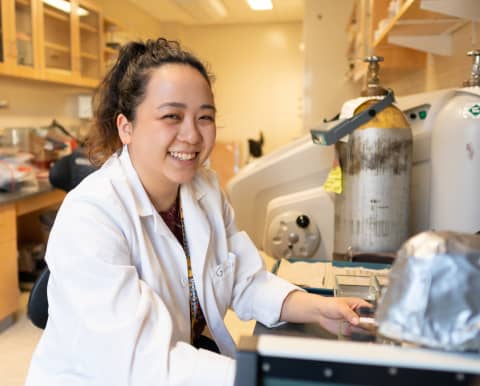
Students are often under the impression that you need to be a graduate student to work in university research laboratories, but more and more students are beginning their research careers during their undergraduate degrees. Laboratory research can be a valuable form of experiential learning.
Yuanyi “Yen” Song is a thirdyear student in physiology and pharmacology who works as an undergraduate researcher in the John Howland Lab — a behavioural neuroscience laboratory on campus headed up by Dr. John Howland, a professor in the anatomy, physiology and pharmacology department.
Song explains what kind of research they do at the Howland Lab.
“We do a lot of behavioural physiology, … but [Dr. Howland] has a background in psychology,” Song said. “I see an intersection between physiology and psychology and also a lot of pharmacology.”
Unlike most physiology laboratories, which tend to focus on research at the cellular level, the Howland Lab studies physiology by observing rodent behaviour. Song explains that they use rats for most of their experiments.
“We do all our research with rodent models — just rats,” Song said. “It’s not a typical experience. I see all my friends doing [research] down to the cellular level, investigating scientific questions that way. And although there is definitely some of that incorporated in our research, [we are] more so focusing on behaviour and interpreting … how different physiological … or pharmacological manipulations will affect that behaviour.”
Song says she has always wanted to do research, and she is eager to start working on her honours project with Dr. Howland next year.
“It was something I was really interested in… I am really excited for my honours project,” Song said. “The reason I am getting excited … is because I get to choose, and right now, I’m leaning towards doing some pain research and how, with the legalization of cannabis, that research is getting revved up in Canada.”
Song hopes to study pain models using synthetic cannabinoids produced in the pharmacology laboratory of Dr. Robert Laprairie — an assistant professor in the College of Pharmacy and Nutrition, the Saskatchewan GlaxoSmithKline research chair in drug discovery and development, and a member of the Cannabinoid Research Initiative of Saskatchewan, a large interdisciplinary group on campus.
“We can take these synthetic cannabinoids and see what they do physiologically and [inform] clinical researchers,” Song said.
With laboratory research, Song says it can be difficult to get your foot in the door, explaining that it sometimes comes down to who you know and what research you’re exposed to.
“I honestly just knew someone in the lab, so hearing about his experience in the lab and what they were doing definitely helped me get interested in it and also gave me an advantage,” Song said. “When I speak to other people, too, it’s a very common experience, because as an undergrad, unless you have exposure to a supervisor by taking a class with them, you don’t really know who they are and they don’t know who you are.”
But Song says that isn’t the only way to get involved in research.
“I know a lot of people that just reach out to professors that they know or [have] heard of through academic advisors and have just as good of an experience,” Song said.
Song encourages other students to take advantage of experiential-learning opportunities and give research a try.
“Research — I love it because some of it comes from creativity and just trying to interpret all of this data, and so many observations come from accidents, too… I learn a lot from observing other people doing experiments, and so, that’s how I have been learning,” Song said. “I love experiential learning.”
—
Amanda Slinger / Copy Editor
Erin Matthews / Opinions Editor
Photo: Riley Deacon / Photo Editor
Leave a Reply